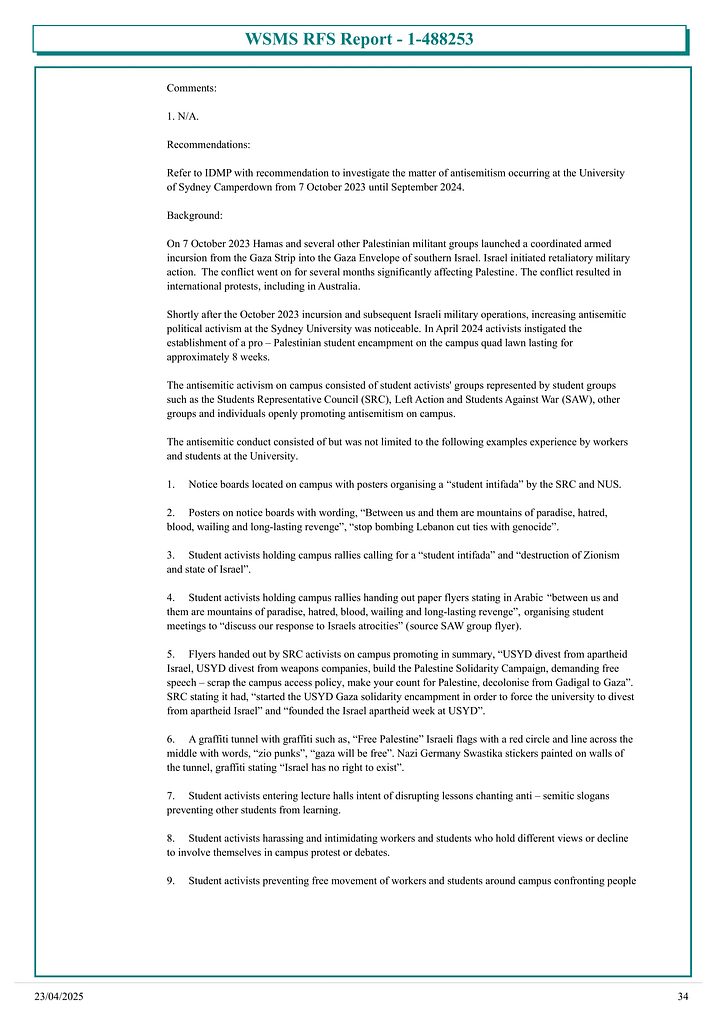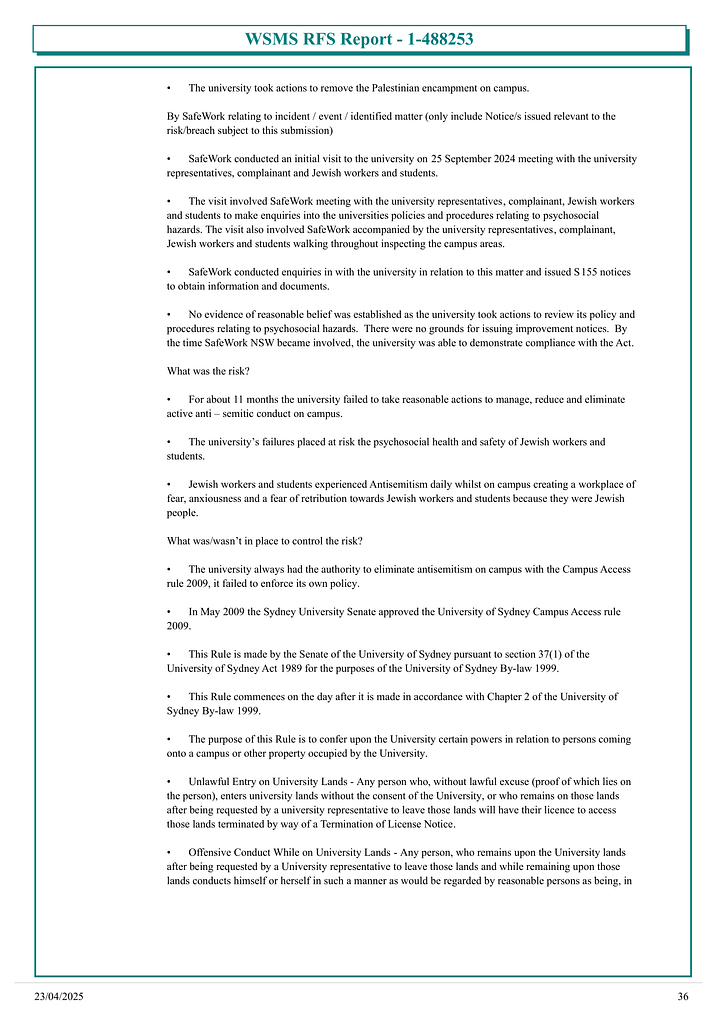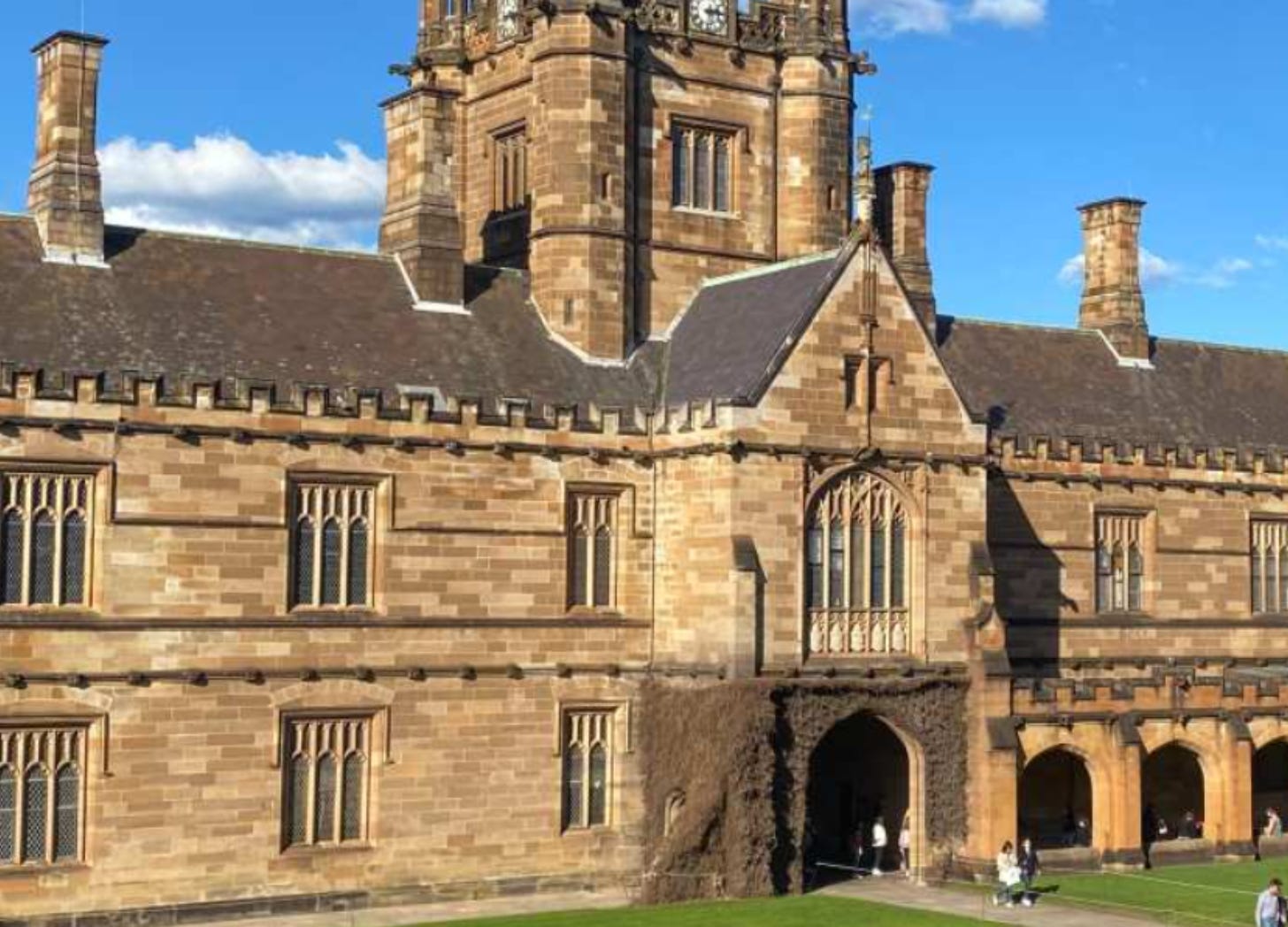SafeWork NSW report labels 'Arabic writing', Palestinian flags 'antisemitic'
SafeWork inspector accused University of Sydney students and staff of 'antisemitic political activism' for supporting Palestine in leaked preliminary report
Slogans such as "Free Palestine" and "Gaza will be free" have been deemed "antisemitic" in a preliminary SafeWork NSW report into allegations of antisemitism at the University of Sydney.
The report, prepared by a SafeWork NSW workplace inspector in February and seen by Deepcut, describes "increasing antisemitic political activism at the Sydney University [sic]" in 2024, including "the establishment of a pro-Palestinian student encampment on the campus quad lawn".
"The antisemitic activism on campus consisted of student activists' groups represented by student groups such as the Students' Representative Council (SRC), Left Action and Students Against War (SAW), [as well as] other groups and individuals openly promoting antisemitism on campus," the report reads.
Several mainstream media outlets covered the report in June after its contents were obtained by Nine media, with much of the coverage amplifying, seemingly with little interrogation, the report's framing of antisemitism on campus. But such framing has now been brought into question, with Deepcut revealing the report contained a list of 13 examples of what the inspector classed as "antisemitic conduct".
Those examples included "notice boards located on campus with posters organising a 'student intifada' by the SRC and [National Union of Students]", slogans in the university's graffiti tunnel and statements from the SRC that it had "started the USYD Gaza solidarity encampment in order to force the university to divest from apartheid Israel”.
University of Sydney SRC president Angus Fisher says "SafeWork NSW has got it wrong", calling the report's findings "just another example of using bureaucracy to silence free speech on the topic of Palestine".
"It is deeply concerning that the SafeWork NSW preliminary report cites student protests, such as encampments, rallies, and even flyering, as inherently antisemitic, without distinguishing between anti-Zionism and anti-Jewish hate," Fisher told Deepcut. "Our support for Palestinian rights is grounded in a long-standing tradition of student activism against occupation, apartheid, and colonial violence. We reject any attempt to smear students advocating for Palestinian liberation as purveyors of hate."
The report also considered flyers supporting the Boycott, Divestment and Sanctions movement and "black flags with Arabic writing" as "overwhelming evidence of antisemitism flourishing throughout the university".
Despite the inspector recommending a full investigation and claiming that "there is no doubt an investigation by SafeWork will identify contraventions of law", the agency declined to further investigate the claims.
In response to questions, SafeWork NSW said, "Following enquiries with the University of Sydney, SafeWork NSW inspectors assessed adequate systems relating to the psychological risk of workers were in place."
"SafeWork NSW’s Independent Decision Making Panel assessed whether the matter should progress to a full investigation, given the University of Sydney had demonstrated compliant behaviours.
"SafeWork NSW has met the University of Sydney and the two complainants to advise them of its decision not to progress to a full investigation."




Report lacking detail
One example of alleged antisemitism cited in the report details "Jewish lecturers witnessing campus activists in large groups demonstrating carrying Palestinian flags and black flags with Arabic writing outside windows of lecture rooms, facilities, passageways, entries and campus areas shouting and chanting disrupting classes and the daily activities of Jewish workers and students".
SafeWork NSW declined to answer questions on whether its inspector made any attempt to find out what the "black flags with Arabic writing" said, or why they were cited as evidence of antisemitism at the university.
Nor does the report provide detail on other examples cited as evidence of "widespread antisemitism" on campus. The inspector details "student activists entering lecture halls intent of [sic] disrupting lessons chanting anti-semitic slogans" without giving information about where or when any slogans were chanted or how the inspector came to the conclusion that they were antisemitic. The report did not elaborate on its claim that "the university failed to moderate anti-semitic conduct on its [intranet and] email system and remove anti-semitic posts from its sites".
Another example cites an internal university incident report from May 2024 alleging that students at the Palestine encampment displayed "a banner showing a Star of David crossed out with a red 'Jews not allowed' [slogan]".
The report provides no further detail of this banner or any attempts by the inspector to verify the incident report.
The report also repeatedly misspells the terms 'antisemitic' and 'antisemitism', referring three times to "anti-sematic" activity and once to "antirentism".
The report's findings have drawn scathing responses from Palestinian and Jewish advocacy groups as well as University of Sydney staff. Australia Palestine Advocacy Network president Nasser Mashni called the report's findings "a clear example of anti-Palestinian racism and institutional overreach".
"The words 'free Palestine', student campaigns calling for their universities to divest from Israeli weapon companies, and the display of the Palestinian flag are legitimate forms of political expression and protest," Mashni told Deepcut. "[The report] undermines serious efforts to combat real antisemitism, as well as endangering the safety, rights and freedoms of Palestinian, Arab, Muslim and allied students and staff."
A spokesperson for the Jewish Council of Australia said the organisation was "deeply troubled by the framing in the SafeWork NSW report", saying it "reflects a seriously troubling and seemingly wilful misunderstanding of both antisemitism and the legitimate rights of students and staff to advocate for Palestinian freedom".
"We are particularly alarmed that this framing ignores the broader context of anti-Palestinian racism – including the vilification, surveillance, and silencing of Palestinian students and staff and their allies," the spokesperson told Deepcut. "When Palestinian solidarity is treated as inherently hateful or threatening, it contributes to a climate of racialised censorship and intimidation on campus."
Nick Riemer, academic vice-president of the National Tertiary Education Union's branch at the university, said that "SafeWork didn't conduct an investigation; it naively and negligently accepted allegations as facts".
"The SafeWork inspector responsible for the report must be the only person in the country who hasn't heard that backers of Israel have been using allegations of antisemitism to discredit the movement against the genocide in Gaza," Riemer told Deepcut. "You would have thought that an investigation process on such a serious issue owed some due diligence to the university community and the people complained about."
Asked to respond to these comments in a follow-up enquiry, SafeWork NSW sent through the same response quoted above.
'The media has failed its most basic responsibilities'
While the preliminary report was not acted on by SafeWork NSW, it was obtained by the Australian Financial Review in June under Freedom of Information laws, prompting extensive media coverage that uncritically repeated the inspector's findings.
A June 4 Financial Review article claimed the report "paints a picture of ongoing incidences of antisemitism on the campus" and featured extensive quotes from Andy Smidt, a former lecturer and researcher in the university's school of health sciences who submitted the original SafeWork complaint in September 2024.
"Smidt said that, following the first site visit, the inspector told her that he 'felt scared in that environment' and said: 'I’m not Jewish, I don’t know how you do it'," the Financial Review article reads.
In an opinion piece published in The Australian in June 2024, Smidt described the student activists who took part in the long-running campus encampment in support of Palestine as "a mob of protesters with alleged links to a terrorist organisation" and claimed the encampment was "infiltrated by a number of radicalised groups (including Hizb ut Tahrir) ... advocating for sharia law and targeting Jewish staff and students on campus".
The Financial Review article was followed by similar stories in the Sydney Morning Herald and The Australian. While all three articles quoted extensively from the preliminary report, none included comment from student and staff groups regarding the alleged antisemitism attributed to them by the SafeWork inspector. Nor did they mention many of the more controversial claims made in the report as evidence of campus antisemitism, including the display of Palestinian flags or flags with "Arabic writing".
Mashni said that mainstream media outlets which favourably published the report's findings had "fuelled moral panic, legitimised repressive measures against student protest and dangerously narrowed the space for public discourse on Israel’s genocide and Australia’s complicity".
"By reproducing inflammatory and inaccurate claims without proper context or challenge, these media outlets have contributed to the vilification of students and staff engaged in peaceful, rights- and justice-based advocacy," Mashni said.
The Jewish Council was similarly scathing, claiming that "the completely irresponsible and sensationalistic media coverage that uncritically repeated the inspector’s claims ... undermines efforts to confront real antisemitism while enabling the marginalisation of pro-Palestinian voices speaking out against an ongoing genocide".
Riemer questioned why mainstream reporters didn't "question whether it is really antisemitic to call on the university to 'cut ties with genocide', as the report claimed? Did the presence of 'Arabic writing' on a flag really seem a solid basis for these very serious allegations? Do the Financial Review, the Sydney Morning Herald and The Australian really think that calling out Israeli atrocities counts as antisemitism?" Riemer said.
"Yet again, the media has failed its most basic responsibilities in its handling of Palestine-related issues."
The Financial Review, the Herald and The Australian were contacted for comment but did not reply in time for publication.




These people are beyond help.
A good safety inspector will generally make themselves known to workplace HSRs(health and safety reps elected by workers), interview them or otherwise include them in an investigation (depending on the matter). I suspect there is a good chance that the university has such safety structures, and I can’t see any evidence that this has happened.
I suspect five minutes with a couple of NTEU HSRs would have neutralised the basis of this report. I’m guessing that’s probably the point though.